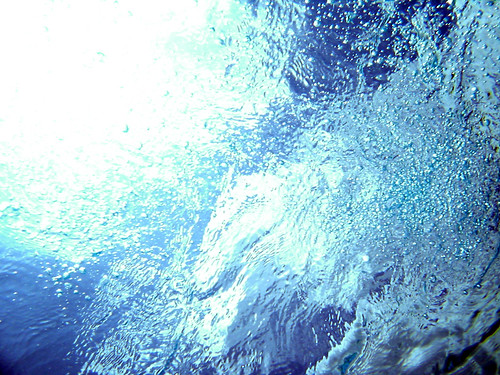In the summer of 2010 Preventable, the community against preventable injuries, ran a contest about water safety, titled “You’re Probably Not Expecting to Drown Today”. Here is my original blog post in response.
photo credit: Scarleth White on Flickr
A child of the wet and wild west coast of Vancouver Island, I am well acquainted with death by drowing. Every year I knew people who died in boat accidents, or at the beach or lake. Sad but true.
My father was the fire warden for MacMillan Bloedel’s Kennedy Lake Logging Camp, and for years operated the ambulance used by the village of Ucluelet. To say that he was safety conscious would be an understatement. Who else do you know with enough hand-held safety equipment at the house to stave off a raging grass fire before it damaged the property? As a result, any activity with a degree of risk came with its rules, regulations and interdictions. Here are a few related to water safety.
Always wear a “life-jacket” or more accurately, Personal Flotation Device (PFD)
Style-wise, things improved dramatically with the advent of the Floater Coat in the late 1960s and early 1970s. Our family never left the dock without everyone, adults included, donning PFDs. My children had them from the time they were toddlers, for visits to the beach or lake. It only takes seconds for a small one to dash away and fall in at the cabin. As they grew older they continued to wear them, even when they were strong swimmers, since their father was a non-swimmer. Who would help them if they ran into trouble?
Never swim on an outgoing tide
Outgoing tides create strong currents and undertows that can sweep swimmers quickly out to sea. Once, on a strange beach in Brittany, I ignored this rule, and barely managed to drag myself from the ocean, sputtering and coughing.
Pay attention to the wind, weather and tide conditions.
It was a typical evening for a stroll after dinner with strong winds rising, blowing toward shore. The small boat roared out from behind the breakwater at Fleming Beach in Esquimalt, only to be quickly smacked down by two strong waves. Thankfully the occupants managed to get the motor restarted and headed back to the boat launch.
Friends were light house keepers at Trial Island off Oak Bay. Although the shore appears close, the tides between the island and the shore are treacherous. They often had to put to with their Zodiac to rescue fool hardy kayakers who had over estimated their paddling abilities.
Carry oars, paddles or a pike-pole on your boat as well as spare gas, and an auxilliary motor if the boat size warrants it.
The operators of the boat in the above anecdote? They didn’t have oars or a pike-pole and barely escaped hitting the rocks.
Have you ever run out of gas in your car? Inconvenient, wasn’t it? Now, imagine you’re in a boat, hours out to sea, and from shore. More than a little inconvenient.
NEVER over load a boat.
It was a typical summer evening. The family at the cabin next door, as well as their visitors, piled into the boat and headed out longitudinally to the next beach. With wind and seas rising, and the boat handling poorly due to the load, it only took one wave to swamp them. Not everyone was wearing a PFD. Small children plummeted down, and drowned quickly. Survivors clung to the over turned vessel. One teen, a strong swimmer, struck out for shore. He never arrived.
Stay with your overturned vessel if you are not wearing a PFD.
The shore is further than you think, and even strong swimmers can become quickly tired. The party who remained with the boat were rescued.
Take swimming and water safety lessons.
My late husband was petrified of the water. On a warm sunny summer afternoon, his beloved brother drowned in the river while people watched from shore, thinking he was just fooling around. Yet, even my husband mustered the courage to finally take lessons at the local pool. Our children also completed Water Safety I and II from the Canadian Red Cross.
It’s important for children, particularly in their tweens and teens, to have some degree of independence in their play. Surrounded as we are by water in the province of British Columbia, it only makes sense that they know what to do in emergencies in and on the water.
Have a wonderful summer, get outdoors and enjoy all our natural environment has to offer. Above all, be safe. When in doubt – DON‘T!
Join Preventable in their goal of ” significantly reducing the number – and severity – of preventable injuries in BC, as they raise awareness, transform attitudes, and ultimately change behaviours.”






Speak Your Mind